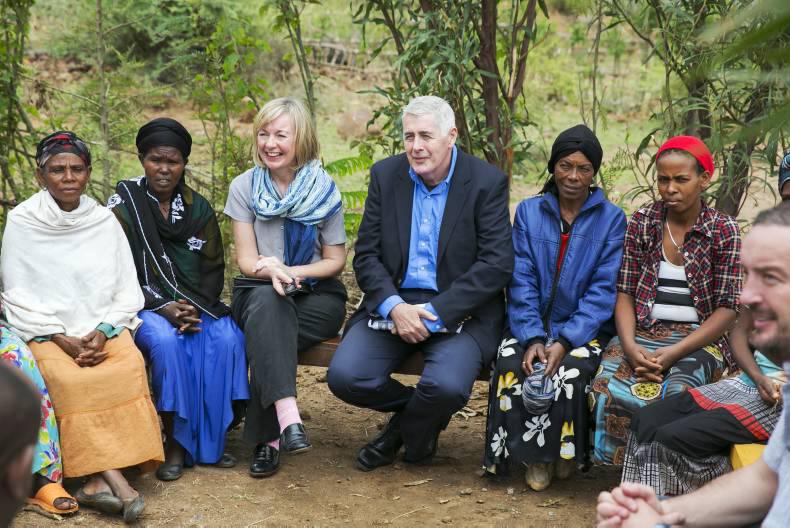I often joke that it’s easier to get mobile phone coverage on the top of a mountain in north Ethiopia than it is in Tipperary,” Catherine – or Kate as she is known among friends – laughs as she explains how Ethiopia, a country once crippled by famine, is making huge strides in terms of development.
Growing up, her father was a vet, and her mother came from a farming background, and so Kate and her siblings were deeply involved in rural life all the time. Having lived in Ethiopia since 2013, where 80% of the people live in rural areas, she still sees the links between rural Ireland and Africa in terms of their development.
“There’s huge development in Addis Ababa, the capital, just like we’ve had in lots of the urban centres in Ireland, but then you go out to the countryside and life is very different.
“I think it’s often forgotten too, both here and back home, the huge role women play in farming, and in rural communities. It would annoy you; when people talk about farmers, they talk about ‘he’, when in fact the women do a lot of the work. They’re often left in the background,” she says.
I think it's often forgotten too, both here and at home, the huge role women play in farming and in rural communities
Kate was part of the Live Aid generation when she embarked on her career with Concern Worldwide over 30 years ago. At the time, rock stars such as Bob Geldof and Bono were mobilising people around the world to raise hundreds of millions in funds for the devastating famine in Ethiopia.
“I think a lot of our generation were really affected by that. Sometimes you feel very helpless in these situations, but then we saw these guys doing something about it, and I suppose we began to realise that we could do something too. That’s when I heard about the job with Concern and I applied,” she says.
Starting off working as a representative for Concern in the west of Ireland, Kate travelled to Sudan when she was 25, where she spent three years doing development work. She also worked in Cambodia and Mozambique before returning to Ireland to work as a rural development lecturer in LIT Thurles. When the job opening for country director came about, Kate jumped at the opportunity.
Family circles
Now living in Addis Ababa with husband, Tim, and 13-year-old son, Richard, Kate never envisaged a career back then so rewarding and interesting, as she describes it herself. However, moving her family to a developing country over 4,000 miles away was not at all easy.
“Our son was only 10 at the time, and neither of us had ever lived in Africa before, so it was a huge adjustment in many ways. They’ve both been incredibly supportive of me, and are great to put up with things like no electricity, or no running water sometimes.
“It’s very different from life at home. Richard can’t just go off down the road with his pals here; you have to be careful. In terms of education, we’re very lucky. His school follows the European system, so the curriculum is very similar to the one at home. Most of the kids are Ethiopian or from other African countries, so he has a huge variety of friends from all over, and that’s been a fantastic experience for him,” she says.
A healthy living
Keeping her family safe and well while living in Ethiopia is very important, and Kate says that one of the biggest challenges is health. “You don’t have the healthcare system you have at home, or the backup. If you get very sick, the facilities wouldn’t be there to treat them, so that’s always the fear. Also, traffic accidents are very common here, so you’d always be worried about that,” she says.
In her role as country director, Kate is responsible for 620 Concern staff, in Addis and around the country. Their work involves nutrition, the provision of water, soil conservation, women’s empowerment, setting up small credit unions and the development of infrastructure.
“This time last year we only had 260 staff, but we’ve had to scale up. Ethiopia is one of the countries worst affected by climate change, and this year an extra 10.2m people are suffering from drought. We’re now working with the Ethiopian health system to address the needs of malnourished women and children.
“We’re also helping to provide water to the worst affected communities, and we’re in the process of providing seed to 95,000 farming households to try and help them recover.”
The road to recovery
“People seem to think that things never change in Africa, but if you look back to what happened in 1984, we’re not seeing anything to that extent. There’s no war, the government is stable and being very active,” she says.
Kate and her family will move back home to their house in Fethard, Co Tipperary, towards the end of the year, and although she looks forward to seeing her family and friends again, and the simple things like bringing the dog for a walk, she will miss life in Ethiopia.
“The people here are so wonderful, so welcoming and warm, and despite their poverty they always have smiles on their faces. Every morning I walk into the office and shake hands with everybody, and you can’t beat it. Yes, it’s tough and it’s demanding, but it’s a really fantastic job,” she says.





SHARING OPTIONS